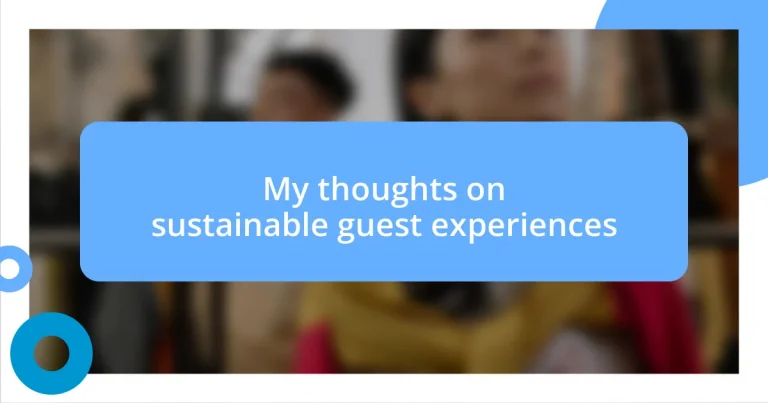Key takeaways:
- Sustainable guest experiences foster emotional connections between travelers and their destinations through community engagement and eco-friendly practices.
- Hospitality businesses often struggle to implement sustainability initiatives effectively, revealing the need for genuine commitment over mere marketing claims.
- Creating a long-term sustainability plan involves setting clear goals, engaging both staff and guests, and continuously refining practices based on feedback and evolving needs.
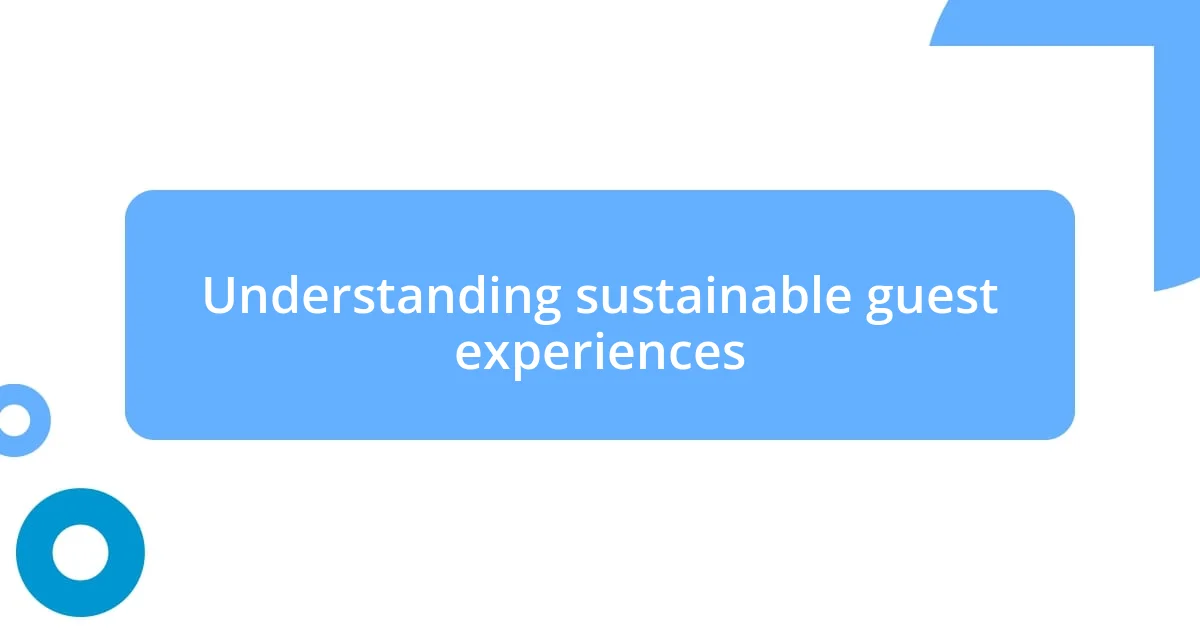
Understanding sustainable guest experiences
Sustainable guest experiences go beyond just eco-friendly initiatives; they create a lasting emotional connection between travelers and their destinations. I remember a trip where the hotel actively involved guests in local conservation efforts. It made me feel part of something larger; cultivating that sense of belonging is what truly enhances a guest’s experience.
Have you ever considered how your choices as a traveler impact the places you visit? Sustainable practices, like supporting local businesses or reducing waste, can profoundly change the way we engage with our surroundings. I’ve found that these conscious decisions not only enhance my travels but also lead to enriching personal interactions with locals who share their stories with pride.
Understanding sustainable guest experiences also means recognizing the importance of education and awareness. For instance, during a workshop at a resort focused on sustainability, I learned how to reduce my carbon footprint while enjoying my vacation. This insight captivated me, convincing me that sustainability isn’t just a buzzword; it’s an integral part of my travel mindset that can inspire and transform both myself and the community I’m visiting.

Assessing current industry practices
In examining current industry practices, it’s clear that many hospitality businesses have started to adopt sustainability initiatives. However, there’s often a gap between intent and actual implementation. I recall visiting a hotel that claimed to be eco-friendly but didn’t follow through on their promises—like offering single-use plastics in dining areas despite their “green” branding. This inconsistency left me feeling skeptical about their commitment.
Here are some common practices I’ve noticed in the industry today:
- Recycling Programs: Many establishments are adopting recycling initiatives but still struggle with proper waste sorting.
- Energy Efficiency: Some hotels are investing in energy-efficient lighting and appliances, yet many guests remain unaware of the benefits.
- Local Sourcing: While supporting local businesses is emphasized, the extent to which this is prioritized can vary greatly, often influenced by convenience rather than genuine commitment.
- Guest Engagement: Some places are using educational materials or workshops, but the format often feels obligatory rather than inviting.
- Carbon Offsetting Options: Some hotels are providing carbon offset initiatives, but personal impact reminders could enhance guest participation.
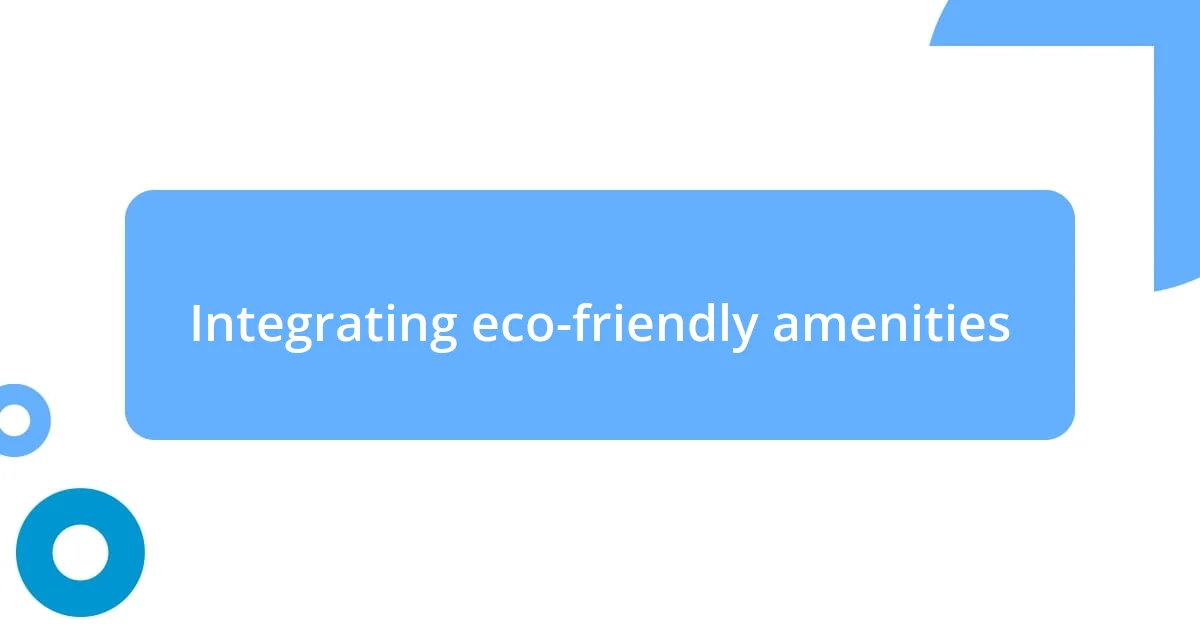
Integrating eco-friendly amenities
Integrating eco-friendly amenities can significantly elevate the guest experience, making sustainability an integral part of the stay. During my last visit to a boutique hotel, I was pleasantly surprised to find that they provided refillable glass water bottles instead of single-use plastic ones. Not only did this reduce waste, but it also made me feel empowered to make an eco-conscious choice while I explored the beautiful surroundings.
I’ve also encountered hotels that have adopted green bathroom products, such as organic toiletries in recyclable packaging. It’s interesting to see how something as simple as a shampoo bottle can reflect a commitment to the environment. When I used those products, I felt a sense of luxury while knowing I was supporting sustainable practices. This type of integration makes guests more mindful and connects them to the ethos of the establishment.
Lastly, in my experience, eco-friendly amenities can expand beyond just products. For instance, some hotels offer vegan dining options sourced from local farms, enriching the culinary experience while supporting the community. I recall dining at a farm-to-table restaurant within a resort—it was not just a meal; it highlighted the relationship between the land and the plate, serving local ingredients prepared with care, which left a lasting impression on me.
| Eco-Friendly Amenities | Impact on Guest Experience |
|---|---|
| Refillable water bottles | Reduces plastic waste and empowers guests |
| Organic toiletries | Combines luxury with sustainability |
| Vegan dining options | Connects guests to local culture and supports community |
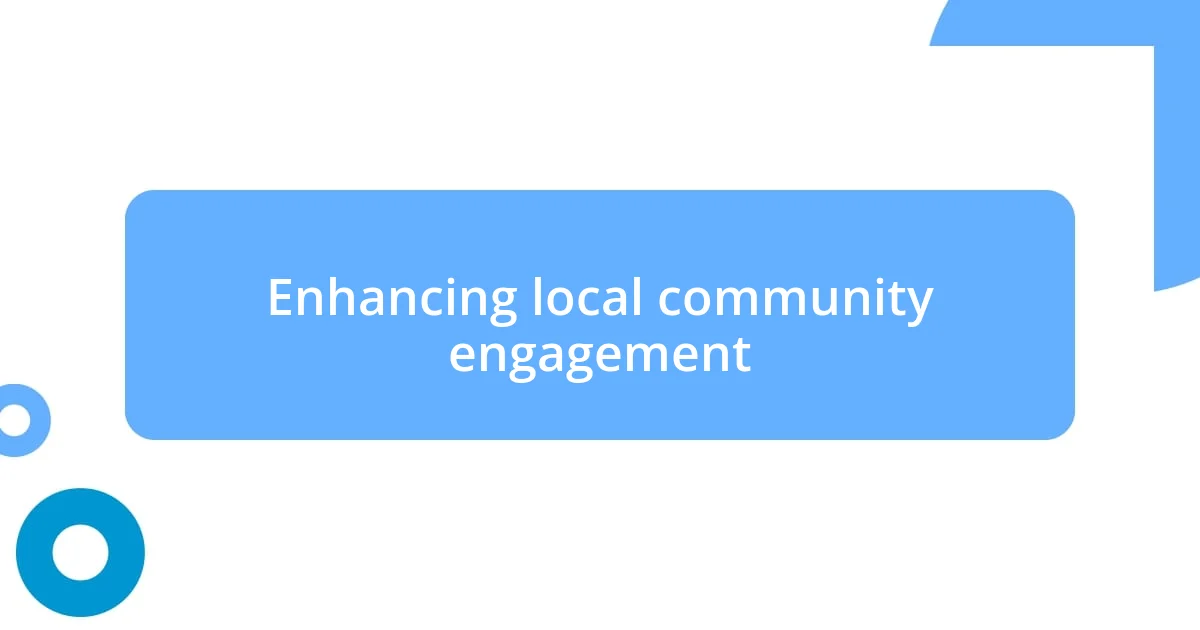
Enhancing local community engagement
Engaging with the local community can transform the guest experience into something deeply enriching. I remember staying at a small inn that organized weekly farmer’s markets, where guests could mingle with local artisans and farmers. It created a lively atmosphere, and I found myself enjoying conversations that went beyond the typical travel small talk. Isn’t it fascinating how these interactions can leave guests with a more profound sense of place?
In my travels, I’ve seen establishments partner with community projects for sustainability. A hotel I visited supported local conservation efforts by inviting guests to participate in beach clean-ups. I joined in, and it felt empowering to contribute to something bigger than my stay. It made me wonder—how often do we get the chance to leave a positive impact while traveling?
Cultural exchange opportunities can also play a significant role in community engagement. At one resort, I attended a cooking class where a local chef shared family recipes using regional ingredients. It wasn’t just about the food; it was a heartfelt story of tradition and heritage. These experiences have shown me that when businesses truly integrate community connections, it fosters a sense of responsibility and pride for both guests and locals alike. How could we not cherish moments like these?
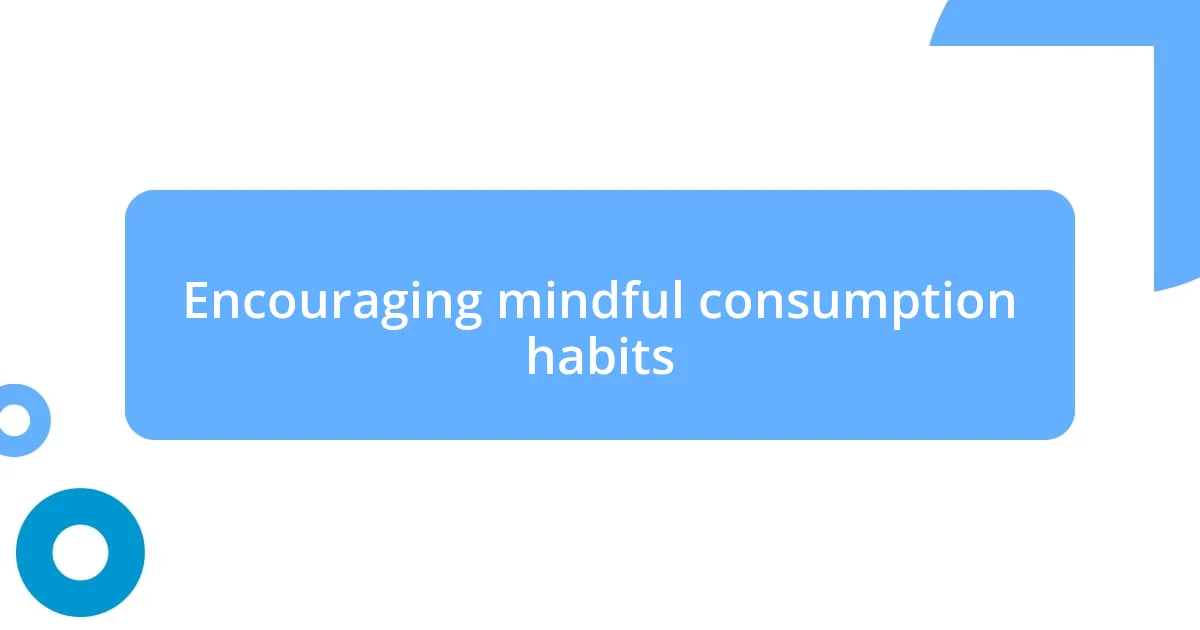
Encouraging mindful consumption habits
Encouraging mindful consumption habits during a stay can deeply enhance a guest’s awareness of their environmental impact. I remember walking into a charming eco-lodge that had a clear message throughout—“consume wisely.” Their thoughtful placement of signage made me pause and consider my choices, whether it was limiting water usage during my shower or making mindful selections at breakfast. This subtle reminder helped me to feel a sense of collective responsibility towards the planet, transforming simple activities into mindful practices.
Think about it: when hotels provide clear information about sourcing local foods and eco-efficient practices, guests begin to see the powerful link between their choices and the environment. At one quaint bed-and-breakfast, I delighted in a breakfast comprised of ingredients sourced from nearby farms. The owner passionately described each dish, emphasizing their contributions to sustainability. It struck me how this not only supported the local economy but also inspired me to consider what I buy in my daily life.
Ultimately, I believe that sharing personal stories about mindful consumption can create a lasting impact. During a stay at a resort known for its sustainability initiatives, I engaged in a workshop where guests shared their own eco-friendly practices. Listening to others’ journeys sparked ideas in me—I found myself committing to reducing single-use plastics in my everyday routine. Isn’t it amazing how a simple conversation or workshop can inspire a ripple effect of positive change, not only on vacation but as part of our daily lives?

Measuring guest satisfaction and feedback
Measuring guest satisfaction and feedback is more than just sending out surveys; it’s about understanding the emotional journey of each guest. At a boutique hotel I frequented, I noticed a unique approach. They invited guests to share their experiences in a relaxed feedback session over coffee. Engaging in those conversations allowed me to express not just what I liked, but also what could be improved, making me feel valued and heard. Isn’t it intriguing how personal interactions can yield more genuine insights than a sterile online form?
While quantitative data is important, I also believe the stories behind the numbers matter immensely. During one of my stays, I received a lovely handwritten note from the manager thanking me for staying and encouraging me to share my thoughts. It was a small gesture that sparked a feeling of connection, prompting me to offer feedback on my experience. The personal touch reminded me that guest satisfaction is intimately tied to emotional engagement, not just statistics—how often do we think about the impact of personalization in hospitality?
Moreover, I’ve found that not all feedback is easy to hear, but it’s always valuable. At a wellness retreat, a guest candidly expressed dissatisfaction with the noise level, which was shared with the staff. Instead of dismissing it, the team held a meeting to address potential solutions. I was impressed by their commitment to improving the experience for future guests, reflecting an understanding that every piece of feedback offers an opportunity for growth. How reassuring is it to know that a place values your voice enough to act on it?
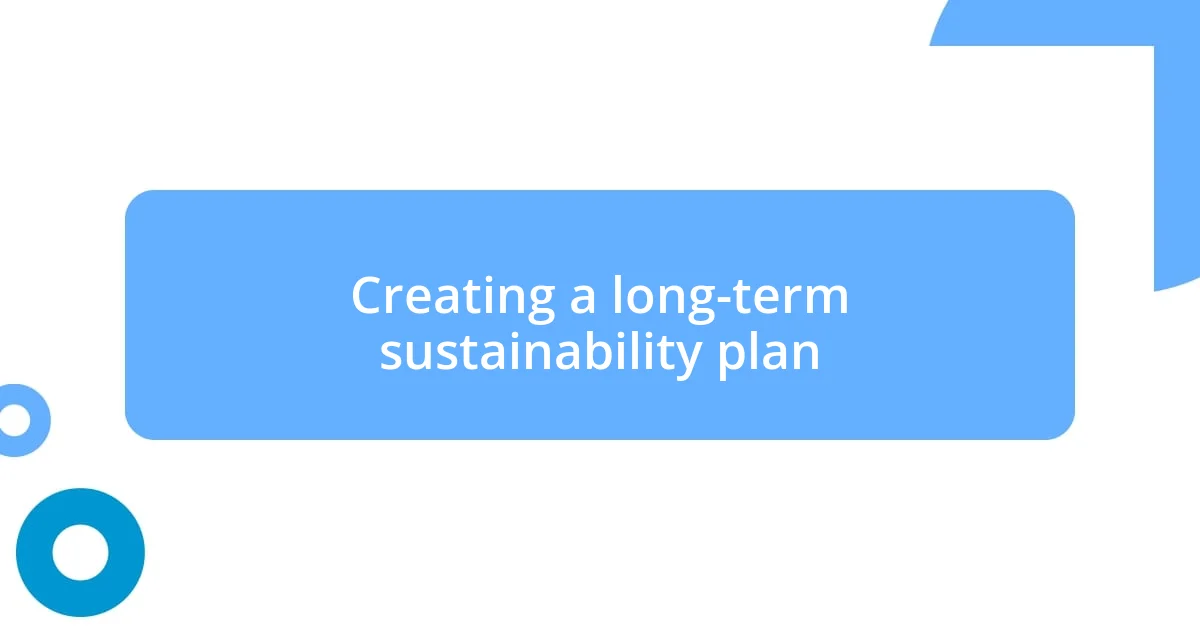
Creating a long-term sustainability plan
Creating a long-term sustainability plan requires a thoughtful and structured approach. In my experience, one effective strategy is to set clear, achievable goals with measurable outcomes. For instance, at a sustainable hotel where I worked, we embarked on a journey to reduce energy consumption by 20% within five years. This involved the simple yet impactful step of upgrading to energy-efficient lighting and regularly assessing our progress. It was rewarding to see how our collective efforts not only helped the environment but also reduced operating costs.
Another crucial aspect is involving both staff and guests in the planning process. During a stay at a resort focused on eco-tourism, I participated in a brainstorming session with the management team. They genuinely wanted our input on ways to improve their sustainability practices. It was refreshing to share ideas, and it left me feeling empowered, knowing my opinions were valued. This collaborative approach not only fosters a sense of community but also engages guests more deeply with sustainability efforts.
Finally, I believe it’s essential to regularly revisit and refine the plan based on feedback and changing circumstances. At one eco-friendly destination, I appreciated how the management held quarterly reviews to assess their sustainability initiatives. They were open to adapting their strategies in response to guest suggestions and evolving practices in sustainability. This flexibility demonstrated their commitment to continuous improvement, which made me feel like I was part of something bigger—a community dedicated to a sustainable future. How often do we recognize that sustainability is an ongoing journey rather than a final destination?












